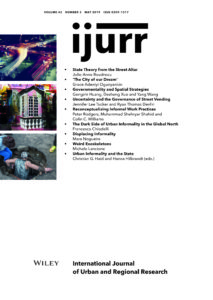Bridging debates on urban sovereignty and urban informality, this paper argues that relationships between sovereignty and informality may not reside exclusively in the way the sovereign state decides to allow or forbid informality, but also in the way sovereignty is distributed among a range of state and non‐state actors. Drawing upon fieldwork on the early‐2010s management of displaced Romanian Romani families in two emergency camps in the city of Montreuil (France), the paper shows how the NGO responsible for managing one camp acted as sovereign power, allowing a number of informal activities to thrive within its confines. By contrast, inside the other camp, managed by another NGO that resolutely implemented state directives, only formal activities took place. Building on Dean’s (2010) concept of ‘disaggregated sovereignty’, the paper mobilizes this disjuncture as a case for critically examining how the ‘state of exception’ takes shape beyond the state’s grip. A subtext running throughout is the parallel between the very first camps for civilians in nineteenth‐century colonized territories and these twenty‐first‐century camps for Roma in Europe—both elicited a state of exception partially predicated on camp dwellers’ perceived ethnic/racial homogeneity.

